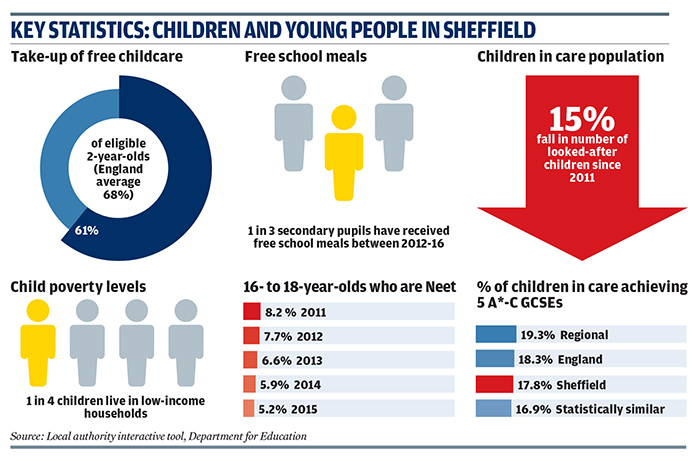Local Spotlight: Sheffield City Council
Derren Hayes
Monday, April 10, 2017
How South Yorkshire's "Steel City" is striving to improve outcomes for children and families despite challenging economic conditions.

Sheffield is the fourth largest city in England with a population of roughly 570,000, around 120,000 of whom are aged under 19.
Like many industrial areas in the North, it experienced economic hardship in the late 20th century as jobs and businesses linked to mining were lost. Extensive investment and redevelopment of the city this century has seen the local economy growing by about five per cent a year. The city's goods and services are estimated to contribute £10bn to the economy.
But the recent collapse in the price of steel has brought fresh uncertainty to the economy, with a number of companies scaling back operations and shedding jobs. The proportion of children under 16 who live in low-income families has risen over the past two years from 23 to 25 per cent, after consistent falls.
Another indicator of deteriorating economic conditions is the rise in the number of children receiving free school meals - this stands at 19.2 per cent of primary pupils and 17.2 per cent of secondary school pupils, levels that are significantly higher than the Yorkshire and Humber regional, and national primary averages of 15.7 and 14.5 per cent respectively.
Sheffield is often said to be "England's biggest village", a reflection of the fact that it was formed through the amalgamation of many hamlets. It could explain why the city has 250 parks, woodlands and gardens, and the highest ratio of trees to people of any city in Europe. It now consists of 28 council wards. The 2016 local elections saw Labour take 56 seats of the 84 seats on the city council.
With the 0-19 population projected to grow by 8,000 by 2025, the pressures on those working with children and young people look unlikely to abate.

Developing a whole life-cycle approach
By Jayne Ludlam, executive director of people services, Sheffield City Council
In Sheffield, we face the same issues that children and young people are facing nationally. The school system is attainment-driven and the requirement to do well in exams has never been so great. This all leads to children growing up more quickly, and they often don't understand how precious their time is as a child.
Thinking about the challenges we face as a city, I notice more the effects of child poverty and the impact that is having on their wellbeing and development. We have an approach that seeks to identify problems early before they escalate into crisis.
There is a real sense of community. We look out for each other, and our children's health and wellbeing is at the forefront of this. All our schools and colleges are signed up to Learn Sheffield, an innovative approach that works with schools in partnership with the council to focus on improvements. Sheffield will be providing 50 schools with support in ensuring that children's good emotional development is promoted. Schools will have access to professional support and guidance from child and mental health specialists.
I have recently moved from the role of executive director of children's services to executive director of people services, which encompasses children, young people, families, adult social care and commissioning. This role presents huge opportunities to improve the co-ordination and quality of services for families and I look forward to developing a whole life-cycle approach. We will no longer be looking at children in isolation but provide care for the whole family. Children move into adulthood and this is a great opportunity to develop services that see the journey into adulthood as a natural progression.
The future success of services lies in partnership working. No one agency has the resources to individually meet families' needs. Only by working collectively will we be able to respond to increasing demands on our services.




